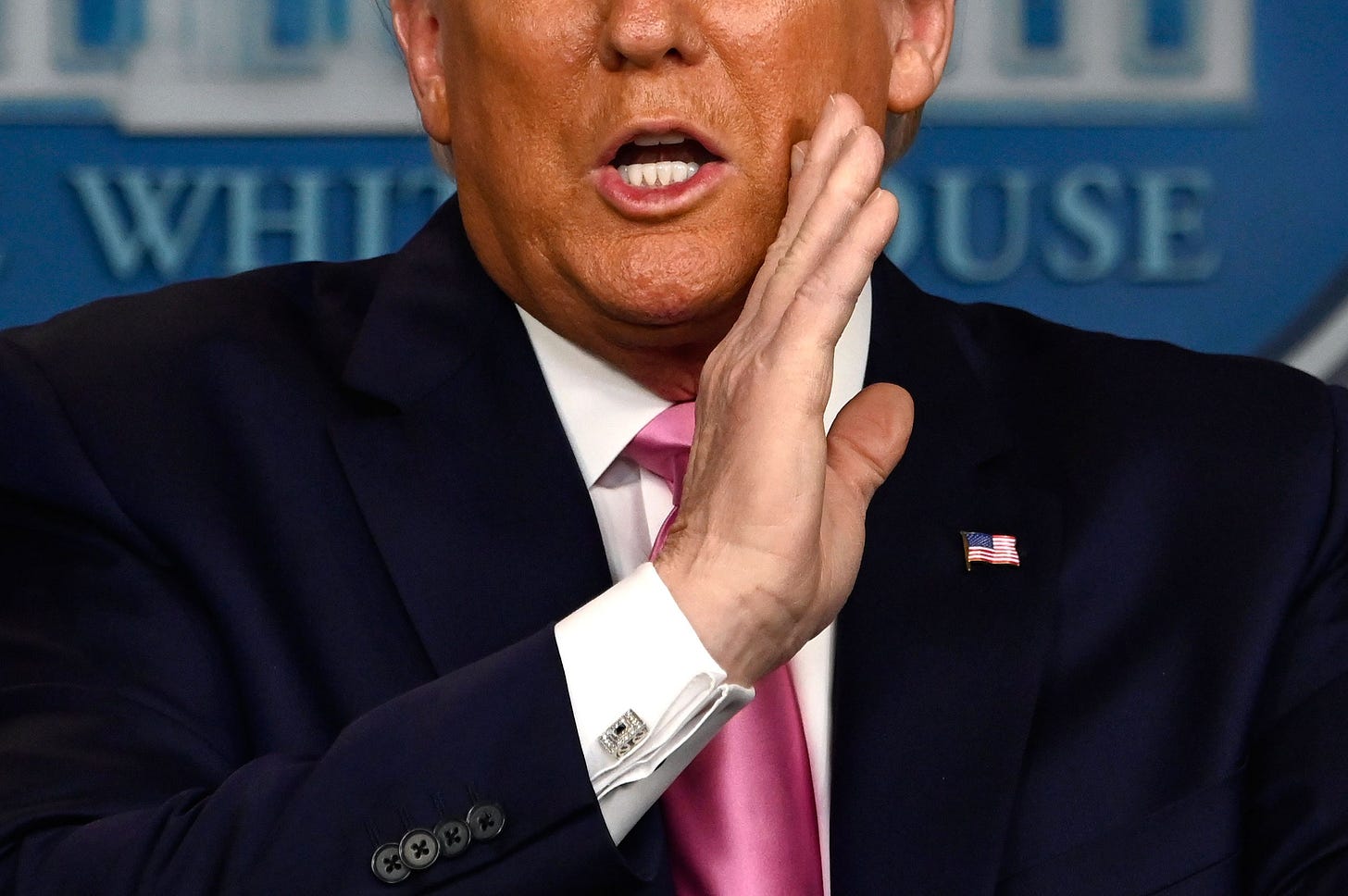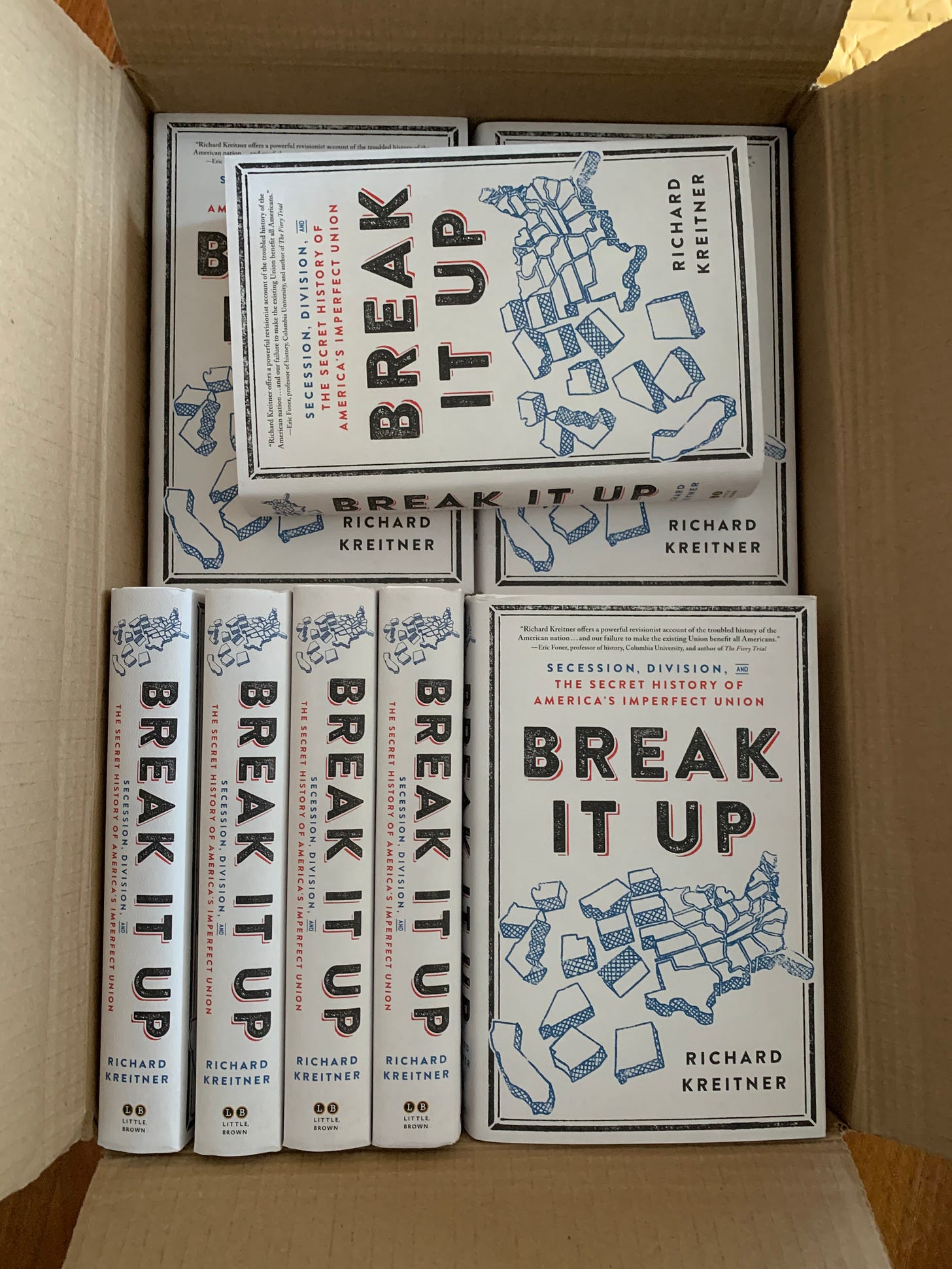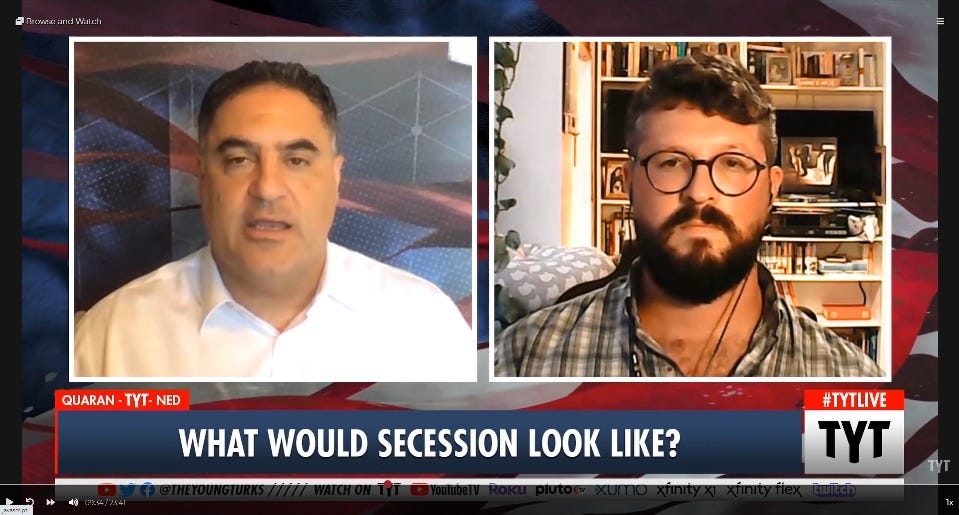'Officially Very Concerned': Waking Up to the 2020 Nightmare Scenario
We're finally recognizing the possibility of a constitutional breakdown after the 2020 elections. But are we really prepared for the worst?
Herewith a fresh installment of this newsletter, its format recently upgraded to deafening acclaim. A new section debuts this week: “Not Even Past,” after the ubiquitous Faulkner quote, will look at a history-related story in the news. Publication day for Break It Up is, dear me, next Tuesday. If you have already pre-ordered a copy (thank you!) or do so now, you should get it around then. I’m already doing interviews most days; a few links are below. Passing strange to finally be letting out through my mouth thoughts I’ve largely kept between my ears. But it’s getting easier—and more fun. Anyway, thanks for reading.
THE AMERICAN EARTHQUAKE
The politicos are “officially very concerned.”
Over the last two weeks, the possibility that the presidential election in November will be contested by the incumbent moved from the margins of mainstream political conversation to the front pages. The Boston Globe related how a bipartisan group of academics and national-security officials have spent the summer war-gaming scenarios in which Trump refuses to leave office and the country falls into a constitutional crisis after the election. The Times observed—as the Times will—that both sides, though in different ways and with varying degrees of justification, were speaking in terms that could delegitimize the results whichever party emerges as the winner. Meanwhile, think-pieces ran Cosmo-like through everything you ever wanted to know about the legalistic mechanics of a contested election but were afraid to ask.
The possibilities are indeed frightening. What if disputes over supposed voter fraud arise in states with governors and legislative majorities from different parties, and multiple sets of returns are submitted to Congress? What if Biden receives millions more votes than Trump but they tie in the Electoral College—a plausible scenario—thus throwing the election into the House of Representatives, where voting occurs by state delegations, a thin majority of which the Republicans control (thanks to blatantly partisan gerrymandering)? What if the military gets involved—where will the allegiances of the troops and high-ranking officers lie? “We could have two self-declared presidents on the eve of next year’s inauguration,” Bret Stephens rightly observes in a column I admit to only having read because it was sent to me, as nearly all are, by my passionately Stephens-worshipping father.
Even a few months ago, questions like these were being dismissed as overly alarmist, distracting. Yet the little green goons attacking peaceful protesters outside the White House, yanking citizens off streets and into vans without any evidence they had committed a crime, seems to have hit home with commentators otherwise inclined to greet Trump’s every outrage only with a solemn and feckless how-dare-you. The strength of the Constitution’s limits on federal authority, what James Madison famously called “these parchment barriers against the encroaching spirit of power,” are about to be tested in a way they have not been for a very long time. I suspect they will be found wanting.

There are sections of my book about the hotly-disputed 1800 election, when an Electoral College tie, unresolved by the House after dozens of ballots, seemed close to triggering a bloody civil war, and about the debacle of 1876 (the year, inauspiciously, of the national centennial), when Democrats and Republicans prepared for war amid allegations of voter-fraud in the half-reconstructed South, before finally settling their differences with an agreement to effectively repeal the Union victory in the Civil War. These passages strike me as newly relevant now, though the specific possibility of violence after a contested 2020 election wasn’t much in my mind when I wrote them. They just seemed like important moments in the larger story: the chronic fragility of the Union, the built-in weaknesses of our Constitution, the errors of omission and commission by its much-lauded framers.
As throughout Trump’s presidency, the past is being ransacked for clues about the future, strip-mined for precedents and tweetable warnings from long-dead statesmen and poets. Yet it’s our lack of appreciation for that larger story, an abiding unwillingness, on the part of both pundits and the public, to appreciate the severity of our country’s position at the moment, that troubles me now, eighty-five days out from Election Day.
Even those who warn of worst-case scenarios refuse to suggest any solutions even remotely equal to the crisis. Dan Pfeiffer, the Obama aide whose belated consternation I quoted at the top, admitted in his next breath that in the event Trump tinkers with the Postal Service to steal the election, an attempt that has already begun, the Democrats possess “limited legislative and legal tools” to fight back. That hasn’t stopped party lawyers from working overtime—lucratively, no doubt—to try to come up with some.
Frankly, I’m surprised I haven’t seen the s-word show up more often. Columnists raise it only to dismiss it with junior-high jests (“we fought a war over that, remember?”). That a constitutional crisis in these supposedly United States could easily lead to a secession crisis was obvious for the first century of our national history; today, we seem placidly oblivious, and prefer to talk our way around the term. The Union remains untouchable. I wonder if my book will change that.
NOT EVEN PAST
For generations, Americans were taught to admire how the North and South came together amicably in the decades after Appomattox, laid old grievances aside, rediscovered what they had in common. We know now that this reunion was sealed on the basis of white supremacy. As I argued in The New Republic this summer, the Confederates’ ideology merged seamlessly with American patriotism. They lost the war but won the peace—and, in the process, reclaimed the right to define the meaning and nature of the Union.
While researching Break It Up, my interest was drawn to defeated Confederates who literally refused to accept defeat: the arch-secessionist who blew his brains out rather than submit to Yankee tyranny, the Confederate general who fled to London, hoping to start a war between Britain and America to create the conditions in which a second Southern rebellion might arise.
But the most interesting story was of the Confederate exiles who moved to Brazil, another slave nation, seeking to preserve their precious “way of life.” Over the years they intermarried with earlier arrivals and built-up communities of “Confederados” devoted, even after Brazilian abolition in 1888, to preserving the memory of the Southern revolt. Anyway, last month a Washington Post writer traveled to the Confederado towns and reported on their particular take on the recent US reckoning over the Stars and Bars. It’s a fascinating read.
BOOK UPDATE
Receiving the hardcovers in the mail last week was a thrilling moment. I couldn’t be more pleased with the straightforward design and crisp production, especially the boldness of the spine. An ornament for any shelf!

Early reviews keep coming in, and I’ve started to make a few media appearances. Library Journal, a trade publication, called Break It Up a “powerful and refreshing account...[that] helps us understand more about today’s political fragmentation.” It was also included in Oprah Magazine’s list of the best books out this month; critic Hamilton Cain described it as a “richly anecdotal, vital account” which “excavate[s] the twisted roots of our country, ever susceptible to unrest.” Here you can see my conversation with Cenk Uyger of The Young Turks (yes, I will be moving the baby pillow out of sight for my next video interview), and here’s my appearance on a podcast hosted by the comedian Pete Dominick (starts at about 1:12:30).

QUOTE OF THE WEEK
“We write to issue an unequivocal warning to the leaders of the United States of America that without urgent action the country risks having a mass atrocity event and constitutional crisis that will threaten both human security and the future of the republic.” — From a “Warning Statement on the Potential for Mass Atrocities in the United States,” signed by more than 150 “former and current atrocities prevention, human rights, humanitarian, counterterrorism, and democratization professionals, advocates, academics, and practitioners”
(I’ve repeatedly had nightmares about such “events” while working on this book. A terrifying thought, but worth pondering and planning for.)



